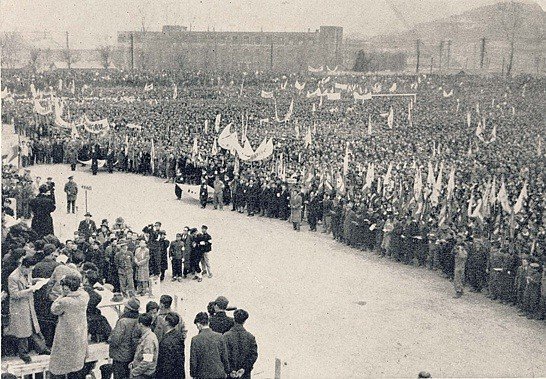(Korean War) The Division of Korea, 1945-1948. Post # 15
Prof. Kathryn Weathersby

On the morning of December 31, 1945, as news spread through the southern zone that the allied powers agreed in Moscow to create a trusteeship for Korea, thousands of people gathered in the center of Seoul to protest the decision. Similar demonstrations began in other cities and towns. Kim Koo, recently returned from his long exile in China, was so outraged that he vowed to seize power from the American military government. He blamed the Korean left for the agreement and accused the US of accepting trusteeship to “appease Russia at all costs.”
In actuality, leftist parties were as opposed to trusteeship as all other groups in Korea. While Pak Hon-yong met with Soviet officers in the northern zone to discuss the situation, the communist party leadership in Seoul planned an anti-trusteeship demonstration for January 3. They never imagined the Soviets would oppose such action, since they believed the Moscow agreement was the work of the Americans. It therefore must have been shocking and confusing when Pak Hon-yong returned with the message that the party must support the trusteeship agreement. As good communists, they nonetheless obeyed the instructions. Later that day they announced that the Communist Party stood in support of the Moscow Conference Agreement. As Robert Scalapino and Chong-sik Lee aptly noted, “never during this era was Russian authority over the Korean Communist movement to be put to a more crucial test – and never was the power of that authority more strikingly revealed.”
Pak Hon-yong also brought back an elaborate, convoluted justification for the party’s position, hastily drafted by Soviet political officers. The “Statement of the Korean Communist Party about the Decision of the Moscow Conference of Three Foreign Ministers on Korea,” began by declaring that inasmuch as the United States and Great Britain “confirmed their readiness to struggle for the strengthening of democratism [sic]” at the Yalta conference, the cooperation of the USSR, the US and the USA strengthens international cooperation and supports peace and security. “At the present time, the three great powers are continuing to carry the responsibility for the leadership of the world, just as they bore the responsibility during the war against fascism. Therefore, the decision of the Moscow conference of three foreign ministers is the furthest development and strengthening of democratism [sic].”
As for the widespread opposition to trusteeship within Korea, the party would explain that the arrangement was necessitated by the pernicious consequences of the long period of Japanese rule and the lack of national unity. “We cannot refuse to admit that such a position exists,” the statement declared. Those who oppose the decision are attempting to lay responsibility for it on the three allied powers rather than on the consequences of Japanese rule. “They portray the friendly aid and cooperation of the three states as the establishment of an imperialistic protectorate, similar to the earlier rule of Japanese aggressive imperialism.”
The party would claim that Kim Koo’s group, in particular, is misleading the Korean people, fraudulently setting them against the democratic powers. To counter Kim Koo’s actions, which represent the greatest present danger for the Korean people, the party must “correctly elucidate to the whole Korean people the true meaning of the decision of the Moscow conference…which has an indisputably progressive character.”
Korean communists should declare that the Moscow decision was a more concrete and definite resolution of the question of independence for Korea, as promised at the Cairo conference. To sweeten the bitter pill, they would hold out the promise that the period of trusteeship could be even shorter if the country met the ominous requirement of “establishing full national unity in the matter of constructing the state.” In other words, if Koreans stopped protesting the agreement and instead cooperated with the communist party to set up a government satisfactory to Moscow, independence would come sooner.
In the next post, we will examine how the Moscow Conference Agreement was popularized in the northern zone and how Cho Man-sik’s refusal to support it led to his removal from political life.
[Sources: George McCune, “Occupation Politics in Korea” Far Eastern Survey 15, No. 3 (February 13, 1946); Richard Lauterbach, Danger from the East; Robert Scalapino and Chong-sik Lee, The Korean Communist Movement, Part I; The statement Soviet officials wrote for the communist party in Seoul comes from Russian State Archive of Social and Political History, Fond 17, Opis 128k, Delo 205, Listy 2-4]
yes this became an additional knowledge for me about the history of the 1945 period and perhaps I still want to understand it. resteem.
thank you for stopping by